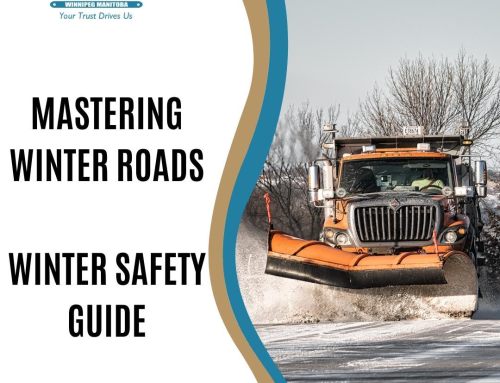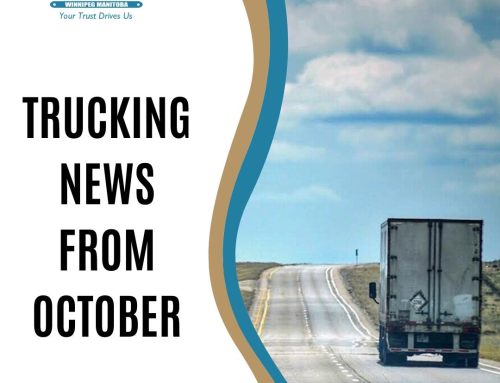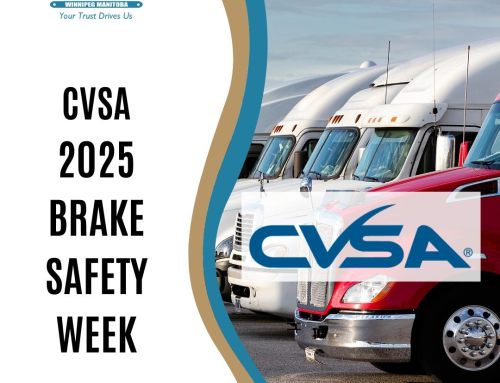 Manitoba Trucking Isn’t Just About Moving Boxes
Manitoba Trucking Isn’t Just About Moving Boxes
The supply chain is still doing a bit of an impression of a roller coaster — and not the fun kind. Just when rates stabilize, capacity swings. Just when things feel predictable, chaos shows up in a new form: driver shortages, border delays, fuel price spikes, new regulations, and tariffs. Welcome to modern freight.
Industry experts are saying the same thing we already know: this market isn’t going back to “normal” anytime soon. Expect some instability through 2025. If you’re hitting the spot market to find a truck every time you need one, you’re vulnerable.
And here’s the part most folks don’t talk about loud enough: your transportation strategy is only as strong as your relationships.
This isn’t about warm fuzzies or who you had lunch with last quarter. It’s about having reliable, responsive, high-performing freight partners that help keep your operations moving when things get messy, because things tend to get messy.
Strong shipper-carrier relationships give you a serious edge:
- When trucks are hard to find, you’re first in line, not begging for a callback.
- When rates spike on the spot market, your costs stay predictable.
- When your customer changes a delivery window with two hours’ notice, your carrier already knows how to flex.
- When things go sideways, you’re not chasing down dispatch — you’re texting someone who actually picks up the phone.
And the benefits don’t stop there. Carriers who know your freight, your dock crew, your customer quirks, and your hot buttons can plan smarter routes, cut transit times, and flag issues before they snowball. That’s not just good service – that’s a competitive advantage.
So if you’re thinking, “Maybe we should look at locking in better partnerships before the next big market shift,” you’re already behind. The good news? Now is the time.
Right now, carriers are open to new relationships, to building lanes, and to finding long-term customers who are just as committed to consistency and communication as they are. Locking that in now means you’re ready when the market tightens – and it will tighten.
This article breaks down exactly why these relationships matter and what you get out of them, not just in emergencies, but every single day. Because in freight, you’re not just moving boxes. You’re moving your business. And that deserves a strategy that doesn’t leave you scrambling.
What is a Shipper-Carrier Relationship? (And Why You Should Care)
A shipper-carrier relationship is exactly what it sounds like: the working relationship between the company that needs to move freight (that’s you, the shipper) and the company that moves it (your transportation provider, aka the carrier). Simple enough, right?
But not all relationships are created equal. Some are built to last. Others are built for convenience, and fall apart the second things get complicated.
Transactional vs. Strategic: Know the Difference
Transactional Relationships
These are your one-and-done deals. You’ve got freight, you post it, you hire whoever bites. Cheapest bid wins. Maybe it works, maybe it doesn’t. Either way, you don’t expect to see that truck — or that dispatcher — ever again.
Example: You go to the spot market to cover a last-minute load. You don’t know the carrier, they don’t know your freight, and if the driver shows up late or brings the wrong trailer? Good luck.
Sure, it gets the job done in the moment. But long-term? It’s a logistical game of Russian roulette.
Strategic Relationships
This is the grown-up version of freight partnerships. You’ve chosen a carrier (or a small group of trusted ones) because they understand your business, your priorities, and your freight. You work together regularly. You don’t just email load details — you talk, you plan, you solve problems.
Example: You’ve got contracted lanes or recurring freight. Your carrier knows your warehouse manager by name. They know your customer has a no-tolerance policy for late deliveries. They show up on time, with the right equipment, because they’ve done it a hundred times before — and they actually want to keep doing it.
Strategic relationships aren’t just more efficient — they’re more profitable, more flexible, and way less stressful.
So, Why Does This Matter?
Because if you’re relying on one-off transactions to run your supply chain, you’re building on quicksand. Every rate hike, capacity crunch, or last-minute reschedule becomes a full-blown crisis. And those pile up fast.
With the right relationships in place, your carrier becomes an extension of your team, not a wildcard you hope comes through.
The rest of this article is going to break down exactly how that kind of partnership pays off.
(Spoiler: it’s not just about better service, though you get that too.)
The Business Case for Strong Shipper-Carrier Relationships
Sure, it feels good to work with people you trust – but this isn’t just about warm fuzzies. Strategic transportation relationships give your business real, measurable advantages, through smoother operations, better pricing, and faster turnarounds – the kind of stuff your bottom line actually cares about.
Access to Capacity When the Market Gets Tight
When the freight market tightens up, which it absolutely will again, trucks get scarce. Rates skyrocket. Spot quotes triple overnight. And guess who gets left scrambling? The folks who treat transportation like a last-minute afterthought.
Carriers aren’t just sitting around with a yard full of trucks waiting for panic calls. They’re focused on protecting their business, too, which means when trucks are limited, they prioritize the shippers they already have relationships with.
Carriers Protect Their Core
You think you’re stressed when you can’t cover a load? Carriers are stressed about keeping their trucks moving, their drivers happy, and their operating ratios in check. So when the market gets ugly, they take care of the shippers they know – the ones who:
- Pay on time
- Provide steady freight
- Don’t treat drivers like garbage
- Actually, answer the phone
It’s simple: if you’re a known, reliable customer, you get the truck. If not, you get the “sorry, can’t help” email and a sky-high spot quote.
Remember the Pandemic?
Yeah. That mess. When everything shut down, capacity dried up, and shipping felt like the Hunger Games. Companies with real partnerships survived with minimal disruption. The rest? Not so lucky.
If that taught us anything, it’s this: relationships are insurance. Not the kind you file claims with – the kind that keeps your freight moving when the world breaks.
More Predictable and Stable Pricing
Spot rates are like gas station hot dogs – fine in a pinch, but you don’t want to build your business around them.
When you’re relying on the spot market for every load, your transportation budget becomes a guessing game. Rates swing wildly from week to week, and your margins disappear every time there’s a holiday, weather event, or carrier shortage.
Now, compare that to working with a carrier partner who:
- Knows your volume
- Understands your business cycles
- Has lanes set up just for you
Suddenly, your rates are more predictable. You can forecast costs, plan your budget, and actually run your business like a business instead of a game of rate roulette.
Strong Relationships Make Negotiations Easier
Carriers aren’t in the business of handing out discounts for fun. But when they know you’re consistent, easy to work with, and not just chasing the cheapest rate of the day? They’re more flexible. Volume + trust = leverage.
This doesn’t mean rock-bottom pricing, but it does mean fair, stable rates that won’t blow up your P&L every time fuel spikes.
Faster, Smoother Load Scheduling
If your carrier already knows:
- Your dock hours
- Your pickup and delivery quirks
- Who to talk to on-site
- How to avoid that one intersection that’s always jammed up
…then guess what? Scheduling becomes a whole lot easier.
No endless back-and-forth confirming details. No need to re-explain your processes every time. No rookie mistakes that delay your freight because the driver didn’t know where to park or which door to use.
Time Saved = Money Saved
Every hour your team spends tracking down ETAs, fixing preventable issues, or answering the same questions for the 10th time is money down the drain.
With a strategic carrier relationship, loads move smoothly. Problems get solved faster. Everyone’s job gets easier – and that adds up to real savings.
Bottom Line:
Strong relationships reduce chaos, cut waste, and give your business a level of control that no spot quote ever will. When you treat your carriers like partners instead of vendors, they return the favour – with better service, better pricing, and fewer fires to put out.
Operational Advantages of Strong Carrier Relationships
It’s easy to focus on price and forget about everything else – until a delivery goes sideways and your customer’s threatening to switch suppliers. That’s when the operational side of a solid shipper-carrier relationship starts showing its real value.
Good partnerships don’t just save you money – they save your reputation, your time, and your sanity.
Improved Routing and Planning
If your transportation plan is just “get it from Point A to Point B,” you’re missing opportunities (and bleeding money). Carriers with a long-term view of your freight can optimize how — and when — your loads move. That’s where the magic happens.
What That Looks Like:
- Fewer deadhead miles (empty trucks = wasted money)
- Consolidated loads where possible
- Better backhaul strategies
- Avoiding congestion-prone routes or sketchy dock situations
When a carrier understands your shipping patterns, they can slot your freight into routes that make the most sense for them and for you. That kind of alignment leads to:
- Lower costs (for both sides)
- More reliable delivery times
- Smaller carbon footprint (yes, you get eco-points too)
It’s like upgrading from “just wing it” to “actually have a plan.” Everyone wins.
Fewer Service Failures (And Fewer Angry Emails)
Let’s be blunt – service failures are expensive. Late deliveries, missed pickups, damaged freight? They don’t just disrupt your schedule; they also compromise your customer relationships.
But here’s the thing, when your carrier knows the ins and outs of your freight, your sites, and your expectations, they screw up less. A lot less.
They know that your #1 customer is strict about appointments. They know which freight needs to be strapped extra tight. They know your dock guy will lose it if the driver’s not there by 3:45. That kind of insider knowledge isn’t something you get from a one-off transactional carrier.
Higher Quality of Service
Here’s something nobody wants to say out loud: not all shippers get treated the same. But it’s true.
When drivers and dispatchers know you’re a “good shipper” – regular loads, organized facilities, decent communication – you get treated like a VIP. And that’s exactly what your freight deserves.
- The Perks of Being a Preferred Partner:
- Your freight gets prioritized
- Your loads get better drivers
- Your issues get answered faster
- You build trust with the people who are actually moving your product
And let’s not forget alignment. When you’ve built a relationship, your carrier understands your business goals. That means fewer misunderstandings, fewer surprises, and more strategic conversations about how to improve service, reduce costs, and stay competitive together.
Bottom Line:
Operational efficiency doesn’t happen by accident. It’s built on consistency, communication, and mutual respect – all of which come from long-term partnerships, not last-minute load board hookups.
Relationship ROI: Dollars and Sense
Let’s cut to it: strong shipper-carrier relationships don’t just “feel good.” They pay off. In real money. In real time.
You want fewer headaches, more uptime, and performance that actually makes your customers happy? Build partnerships, not just purchase orders. The ROI is in the details. Here’s how it adds up:
Reduced Administrative Burden
If your shipping department spends half the day chasing quotes, tracking down trucks, and fixing billing screw-ups, congrats – you’re burning payroll on stuff that shouldn’t be happening in the first place.
With a strategic carrier relationship, all that noise fades into the background.
What You Don’t Have to Deal With:
- Calling five carriers to beg for capacity
- Double-checking every rate because the last one “forgot to include fuel”
- Playing CSI with a billing dispute
- Waiting on hold for an ETA that’s three hours old
When your carrier knows your lanes, your paperwork, and your expectations? Things just work. Loads get booked faster. Communication gets smoother. Admin becomes a formality, not a fire drill.
Translation: Your ops team can focus on scaling, not babysitting.
Improved Performance Metrics
Want to impress the boss? Show them KPIs that are actually moving in the right direction, and staying there.
When you’ve got a solid carrier relationship, performance metrics go from “meh” to money.
You’ll See:
- Higher on-time delivery rates — because your carrier plans ahead, avoids surprises, and actually gives a damn.
- Fewer damages and claims — because drivers know how to handle your freight, and your carrier isn’t subbing it out to some random truck off a load board.
- Less finger-pointing — because everyone’s aligned, expectations are clear, and issues get handled without drama.
Oh — and customer satisfaction?
Yeah, that skyrockets too. Because customers notice when things arrive on time, in one piece, without excuses. Reliable transportation means reliable service — and that’s the kind of thing that keeps them coming back.
Bottom Line:
You can’t afford NOT to invest in good carrier relationships. The time, money, and sanity you save will show up all over your business – in better metrics, happier teams, and customers who aren’t looking for the exit.
Strategic Benefits for Growth
You don’t build a thriving business by winging it one shipment at a time. You build it by locking in partners who can grow with you, who don’t just move freight, but help move your business forward.
Because here’s the truth: a good carrier does more than drive a truck. They become part of your team – and a damn valuable one at that.
Collaboration and Innovation
If you think your transportation provider is just there to show up, load up, and drive off, think bigger.
Long-term carrier relationships open the door to real collaboration. Not just problem-solving, but problem-preventing and spotting opportunities to get better, faster, and leaner.
What That Can Look Like:
- Identifying bottlenecks at your dock or in your scheduling process
- Offering drop trailer programs to save you time and reduce congestion
- Suggesting better routing to avoid repeat delays or high-traffic trouble zones
- Providing rush services or dedicated equipment when you need flexibility to seize last-minute sales or big projects
- Carriers that know your business can spot patterns you might miss – and bring suggestions to the table that actually make sense.
It’s not just shipping. It’s strategy.
Scalability
You’ve got growth goals? Cool. Just make sure your logistics can keep up.
One-off carriers might handle today’s shipment, but when you land that big new customer or expand into a new region, who’s going to make sure those deliveries actually happen – and happen right?
That’s where a strong carrier relationship shines.
Here’s What You Get:
- A partner who’s ready to scale with you — not scramble at the last minute
- Faster onboarding of new lanes, customers, or services because your carrier already gets how you work
- Confidence in consistency — same level of service, even as volume grows
- A built-in problem-solver who’s invested in your success, not just your invoice
When you grow, your carrier grows. That kind of mutual motivation creates a win-win mindset that’s hard to beat.
Bottom Line:
If you’re serious about scaling, you need more than trucks – you need trust. You need a carrier that’s not just reacting to your growth, but fueling it.
What Shippers Can Do to Build Stronger Carrier Relationships
Newsflash: strong relationships are a two-way street. You can’t expect top-tier service if you’re treating your carrier like an afterthought. Want loyalty, consistency, and priority treatment? Start acting like a partner, not just another line on someone’s dispatch board.
Here’s how to make sure your carrier actually wants to work with you – and keeps showing up with their A-game.
Be Transparent and Communicate Expectations Clearly
I can’t stress this enough – carriers aren’t mind readers. If your dock closes early on Fridays, or your customer gets twitchy when freight runs late, say that. The more they know, the better they can plan, execute, and problem-solve.
Clear communication means:
- Sharing dock hours, contact names, and special requirements upfront
- Giving realistic lead times and heads-up about changes
- Being honest about what success looks like (and what’ll get them fired)
Tip: Good carriers appreciate the truth, even if it’s messy. Don’t sugarcoat – communicate.
Treat Carriers as Partners, Not Vendors
If your only question is, “What’s the rate?” – you’re missing the point.
Price matters, yes. But so does respect. A carrier who feels valued is going to go further, faster, and with fewer excuses.
- Want to stand out?
- Pay on time (don’t make them chase you)
- Give feedback — not just when things go wrong
- Include them in planning conversations when big changes are coming
You’re not just booking trucks. You’re building trust.
Be Consistent with Freight Volume and Scheduling
Nobody likes a rollercoaster – especially not carriers trying to plan their equipment, drivers, and routes. The more consistent you are, the more smoothly everything runs.
You don’t need to be a high-volume shipper! Even if your freight isn’t high-volume, consistency builds reliability.
Be the kind of shipper who:
- Loads on time
- Doesn’t bounce between carriers every other week
- Gives predictable volumes (or a heads-up when things shift)
You want guaranteed trucks? Be someone they can count on.
Provide Driver-Friendly Facilities
Let’s be blunt: drivers talk. And if your facility is a nightmare – bad parking, rude staff, four-hour waits -0 that reputation spreads. Fast.
Want to become a “preferred shipper”? Make it easy for drivers to do their job.
That means:
- Clear signage and directions
- Clean restrooms and waiting areas
- Efficient check-in processes
- Fair wait times for loading and unloading
- Happy drivers = happy dispatch = smoother service.
And when capacity gets tight? Guess who they’ll prioritize?
Bottom Line:
Carriers notice who treats them like people and who treats them like problems. Be the shipper they want to work with – and you’ll earn better rates, better service, and better long-term results.
Why Len Dubois Trucking is a Trusted Partner
Let’s cut to the chase: not all carriers are created equal. Some talk a big game. Len Dubois Trucking? We’ve been walking the walk for over 30 years – and we’re just getting started.
We don’t just move freight. We build long-term partnerships rooted in reliability, safety, and damn good service. If you’re tired of chasing trucks, dealing with ghosted dispatchers, or babysitting your loads, it’s time for a better way.
Here’s what sets Len Dubois Trucking apart:
30+ Years of Dry Van Freight Experience
This isn’t our first rodeo. We’ve hauled freight across Canada and the U.S. through ice storms, border slowdowns, and that little global event called a pandemic. We’ve stayed steady while others flaked out — because we know how much your freight (and your reputation) matters.
Communication You Can Count On
Nobody likes surprises – especially the kind that come with late deliveries or no-show trucks. Our dispatch team keeps you in the loop, our drivers are professionals, and our processes are built to keep your operation running smooth.
We believe in real communication – the kind where you don’t have to chase someone down to get an update. That’s our standard.
Professionalism, Safety, and Service
We don’t cut corners, period. From clean equipment to safe, courteous drivers, we represent your business like it’s our own — because when we haul your freight, your name is on the line, too.
Our safety standards are high. Our commitment to service is higher. And we’re proud of the reputation we’ve earned — and protected — for three decades.
We’re In It for the Long Haul
We’re not interested in being your “backup carrier.” We want to be your first call – the one you rely on when deadlines are tight, when the market gets messy, or when your customers are counting on you.
Because at the end of the day, we know one thing:
Your trust drives us.
Ready to Build a Real Partnership?
If you’re done chasing rates and scrambling for trucks, let’s talk. We’ll show you what it’s like to work with a carrier that treats your freight like our own – and your success like our mission.




